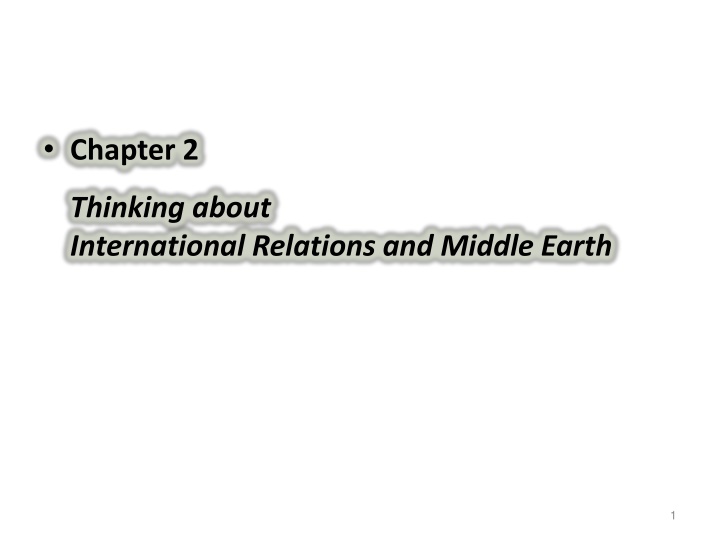
Thinking about International Relations in a Changing World
Explore the fundamental concepts of international relations, including the balance between order and justice, challenges for domestic and international order, and the critical issues of justice in today's world. Delve into analytical frameworks and paradigms shaping how we understand global politics.
Download Presentation

Please find below an Image/Link to download the presentation.
The content on the website is provided AS IS for your information and personal use only. It may not be sold, licensed, or shared on other websites without obtaining consent from the author. If you encounter any issues during the download, it is possible that the publisher has removed the file from their server.
You are allowed to download the files provided on this website for personal or commercial use, subject to the condition that they are used lawfully. All files are the property of their respective owners.
The content on the website is provided AS IS for your information and personal use only. It may not be sold, licensed, or shared on other websites without obtaining consent from the author.
E N D
Presentation Transcript
Chapter 2 Thinking about International Relations and Middle Earth 1
A basic dilemma of IR theory Order v. Justice 2
Order is important within the state, and within the international system. 3
What are the issues important for domestic order? 4
What are the issues important for international order? 5
What issues of justice must be addressed to make the world a better place? Human Rights Environment Globalization Technology Security Inequality Women, Children, Minorities Population, Health 6
Miles Law Where you stand depends on where you sit 7
Analytical Frameworks Paradigms How do we think about International Relations? 8
Levels of Analysis International System International level is most aggregated State States are the principle units of world politics At individual level, decision-making is the focus Individual 9
Paradigms 1. involve assumptions about the nature or Order of the world, how knowledge is obtained. 2. contain assumptions about what the world SHOULD be or its Justice 10
Problem-solving paradigms concentrate on why the world is the way it is. 11
Critical paradigms concentrate on what the world should be and how to get there. 12
Different types of theory have different aims Explanatory or problem-solving Concentrates on perceptions, ideas and beliefs Critical of particular social arrangements or outcomes 13
Is objectivity possible? Can researchers not be influenced by personal opinions or prejudices? 14
How do we evaluate the strengths and weaknesses of the various approaches? 15
Introducing the Two Oldest (Problem- solving) IR Paradigms There is a major debate in IR about how to view the world: Realism Vs. Liberalism 16
CLASSICAL CLASSICAL LIBERALISM LIBERALISM CLASSICAL REALISM Human nature is inherently flawed 17
CLASSICAL CLASSICAL LIBERALISM LIBERALISM CLASSICAL REALISM Human nature is inherently flawed Conflict is the normal state of the world 18
Conflict is inevitable in a world of limited resources. If two or more states want the same thing at the same time, conflict is likely. Realism tends to be pessimistic about the world of IR, expecting continual conflicts over the struggle for power 19
CLASSICAL CLASSICAL LIBERALISM LIBERALISM CLASSICAL REALISM Human nature is inherently flawed Conflict is the normal state of the world States are the primary actors in the international system 20
State security is most important States are self-interested, power- seeking rational actors States seek to maximize there security and chances of survival 21
CLASSICAL CLASSICAL LIBERALISM LIBERALISM CLASSICAL REALISM Human nature may be flawed, but people are inherently good Human nature is inherently flawed Conflict is the normal state of the world States are the primary actors in the international system 22
If we understand each other, the possibility of conflict lessens. There are many examples of human communities working together to circumvent violence and conflict. 23
CLASSICAL CLASSICAL LIBERALISM LIBERALISM CLASSICAL REALISM Human nature may be flawed, but people are inherently good Conflict is not the norm, but an aberration Human nature is inherently flawed Conflict is the normal state of the world States are the primary actors in the international system 24
CLASSICAL CLASSICAL LIBERALISM LIBERALISM CLASSICAL REALISM Human nature may be flawed, but people are inherently good Conflict is not the norm, but an aberration NGO s & other non- state actors play a significant role in the international system Human nature is inherently flawed Conflict is the normal state of the world States are the primary actors in the international system 25


